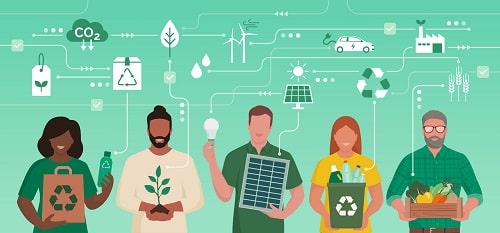Although products made from recycled materials are often viewed as the most sustainable purchasing option, products made from virgin materials can often have a lower environmental impact if they are more durable and last longer.
Features
Why prioritising product longevity can boost an organisation’s sustainability performance
The latest Love Sustainability insights report from Rubbermaid Commercial Products (RCP), Why Product Longevity is a Powerful First Step to Improving Commercial Sustainability, has found that low frequency sustainability, durability and reducing consumption are far more effective than an increase in so-called ‘green purchasing’ for both the planet and business’ budgets. So, what kind of challenges and blockers do businesses face when it comes to implementing practices to improve commercial sustainability?
 Photograph: Newell Brands
Photograph: Newell Brands
The power to make sustainable change
Working together, businesses have the power to make systemic, impactful change. However, a staggering 95 per cent of businesses¹ identify that there is much work still to be done, with the key areas for investment into sustainability² being waste management (81 per cent), recycling (60 per cent), sustainable materials (60 per cent) and energy efficiency (58 per cent).
So, how should businesses prioritise? How can they ensure that they are making the right sustainable choices by investing in genuinely sustainable practices without falling into the trap of ‘greenwashing’?
Low frequency sustainability
For a vast majority of businesses, when considering what makes a product sustainable, those made from recycled materials are often the first port of call. However, if your ultimate goal is to keep waste out of the chain rather than add to it, then opting for recycled products may not always be the most sustainable choice. When it comes to ‘sustainable products’, other considerations such as durability and the adage of ‘buy better, waste less’ should come into play.
When looking at purchases, it’s important to understand if the majority of a product’s global warming potential is created during production. If we take the example of a recycling container, 96 per cent of the global warming potential is during production³. The longer the life of a product, the less global warming potential it has as long life eliminates production cycles where the majority of the warming potential is created.
Durability is better for the bottom line
Another challenge for many comes when factoring in the needs and aims of the business, its shareholders and its customers – ensuring both sustainability and commerciality are prioritised. Due to the current economic situation, as operational costs squeeze budgets, this focus on commerciality has only increased in recent times. In fact, 80 per cent of businesses agree that rising costs and inflation⁴ are the most significant challenges they face in the coming years.
For 60 per cent of businesses the perceived investment and increase in ongoing costs for more sustainable practices is cited as a barrier to implementation. However, in a positive shift in perception, 74 per cent disagreed that more sustainable products cost more⁵. This shift in mindset could see businesses reduce their environmental and business costs of remanufacture, operational downtime, and the transport of materials.
Reducing consumption beats ‘green’ buying
Further, businesses need to understand that reducing consumption over ‘green’ purchasing will result not only in significant sustainability gains but financial ones too. Extending the lifecycle of passive products (products that do not require energy usage, or supplementary materials during their life cycle – for example, the bins in a business facility), reduces environmental impact by up to 72 per cent and reduces commercial cost by up to a third⁶.
Let’s take an example. You’re going to replace the waste containers in your facility. Your choice is to opt for a brand new, freshly manufactured container or go for one made from recycled material. You might assume that a container made from recycled material is the more sustainable option. However, when we make our purchasing decisions we need to take into consideration where that recycled material has come from, the ecological cost of its remanufacturing and its durability.
Often, recycled materials suffer degradation over time⁷ and need remanufacturing sooner. Once you recycle plastic, it has to be recycled more often as the resulting products often don’t last as long. This starts an endless cycle of increasing resource use. So, considering the product longevity and material origins of each container, opting for a brand-new waste container that is built to last is actually the more sustainable choice here.
We know that 95 per cent of decision makers⁸ want to do more on sustainability but face various blockers to implementation. Supporting businesses in turning sustainability ideas into action, the new report helps to identify and overcome future challenges to implementation and provides data-driven recommendations to combat ‘green confusion’, reassess purchasing decisions and ultimately improve operational and systemic sustainability.
This latest report follows on from the Love Sustainability Journey, a roadmap to support businesses to make incremental sustainability gains against a backdrop of commercial considerations and challenges.
Emilio Capelli is VP sales and marketing international at Newell Brands.
For more information on the Love Sustainability Journey or to download the Why Product Longevity is a Powerful First Step to Improving Commercial Sustainability report, go to:
rubbermaid.eu/en/sustainability-journey/
References
- RCP Research – Question 8
- RCP Research – Question 10
- Global Warming Potential from Production (section 4.2.2)
- RCP Research – Question 6
- RCP Research – Question 25
- The Benefits of Extending Passive Products Lifespans
- Material Degradation in Recycling Processes (section 3.1)
- RCP Research – Question 8
FEATURES

Aligning organisational culture with sustainability: a win, win for the environment and business
By Dr Keith Whitehead, British Safety Council on 04 April 2025
The culture of an organisation is crucial in determining how successfully it implements, integrates and achieves its sustainability and environmental goals and practices. However, there are a number of simple ways of ensuring a positive organisational culture where everyone is fully committed to achieving excellent sustainability performance.

Why quality data is essential when using AI for occupational safety and health management
By Dr Bob Rajan-Sithamparanadarajah. Safety Groups UK (SGUK) on 01 April 2025
Artificial intelligence-powered models, systems and technology have the potential to significantly improve the management of occupational safety and health (OSH) risks, but it is vital that OSH practitioners understand the limitations and dangers of using AI to protect people at work.

Sustainable aviation fuels: how do we put the SAFety in SAF?
By Megan Hine, Draeger Safety UK on 01 April 2025
Sustainable aviation fuel is seen as having great potential to reduce the greenhouse gas emissions from air transportation. However, as with other emerging renewable energy sources, the safety risks arising from the production, processing and storage of these biofuels can be accompanied by new risks and will require careful management from the safety industry as utilisation increases to meet the Government’s mandatory targets.



